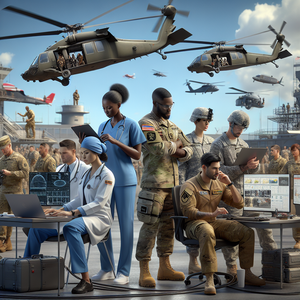
Forging Your Path: Discover 20 Dynamic Career Opportunities in the U.S. Army
The U.S. Army is a gateway to a broad spectrum of career paths that cater to various interests and skill sets. Whether you're drawn to the thrill of combat roles or the intricacies of technical positions, serving in the Army allows individuals to contribute to their country while gaining essential skills for future endeavors.
Job Summaries:
Infantry Officer:
- Infantry Officers serve as pivotal leaders in combat, directing troops and crafting strategies for missions.
- A bachelor’s degree, completion of Officer Candidate School (OCS), and robust leadership skills are essential.
- These officers play a crucial role in mission success and unit cohesion.
Cyber Warfare Officer:
- In an age where cyber threats loom large, Cyber Warfare Officers are on the front lines of digital defense.
- They protect Army networks and analyze vulnerabilities, requiring backgrounds in computer science or IT.
Combat Medic Specialist:
- Combat Medic Specialists are the lifeline on the battlefield.
- Delivering emergency medical care and managing evacuations.
- Training as a Combat Medic is rigorous.
- Many have prior medical experience.
Logistics Officer:
- Logistics Officers are the backbone of supply chain management in the Army.
- They ensure timely resource distribution.
- A degree in logistics or supply chain management is typically required.
Military Intelligence Officer:
- Military Intelligence Officers are tasked with gathering and analyzing intelligence to inform strategic decisions.
- A background in intelligence studies or political science is beneficial.
Aviation Officer:
- Aviation Officers pilot Army aircraft
- Aviation Officers oversee aviation operations
- Completion of flight training is required
- A commercial pilot's license is required
Human Resources Specialist:
- Human Resources Specialists are vital to personnel management.
- They oversee recruitment and training.
- Typically requiring a bachelor’s degree in HR or business administration.
Cyber Electromagnetic Warfare Officer:
- These officers blend cyber capabilities with electronic warfare tactics to disrupt enemy communications.
- This role demands expertise in both fields.
Field Artillery Officer:
- Field Artillery Officers lead teams in operating artillery systems and planning fire missions.
- A degree in a relevant field and completion of specialized training are prerequisites.
Construction Engineer:
- Construction Engineers plan and execute military construction projects.
- They ensure projects align with Army standards.
- A degree in civil engineering or construction management is required.
Military Police Officer:
- Military Police Officers uphold law and order within the Army.
- Enforcing military laws and conducting investigations.
- A high school diploma is necessary.
- Military police training is necessary.
Signals Intelligence Analyst:
- Signals Intelligence Analysts interpret communication data to provide critical insights.
- A background in IT or intelligence studies is advantageous.
Administrative Support Assistant:
- Administrative Support Assistants manage clerical tasks
- Ensuring smooth communication and documentation
- A high school diploma is typically required
Public Affairs Specialist:
- Public Affairs Specialists serve as the voice of the Army.
- They manage communication with the public and media.
- A degree in communications or public relations is often necessary.
Supply Chain Manager:
- Supply Chain Managers oversee logistics operations critical for Army readiness.
- Ensuring efficient equipment procurement and delivery.
- A background in logistics is usually required.
Food Service Specialist:
- Food Service Specialists prepare and serve meals.
- They cater to soldiers' dietary needs.
- Training in food service management is essential.
Environmental Science Officer:
- Environmental Science Officers focus on the Army's environmental impact.
- Developing sustainability policies.
- A degree in environmental science is typically required.
Intelligence Operations Specialist:
- Intelligence Operations Specialists support data collection and analysis for operational planning.
- A background in intelligence studies is often required.
Tactical Communications Specialist:
- These specialists manage communication systems in the field.
- Ensuring operational equipment functions smoothly.
- A background in telecommunications is beneficial.
Counterintelligence Agent:
- Counterintelligence Agents work to detect and prevent espionage against the Army.
- They conduct investigations and analyze intelligence.
- A degree in intelligence studies is often required.
The diverse career paths within the U.S. Army offer unique opportunities for individuals to contribute meaningfully to their nation's defense while gaining skills for future careers. Each role plays a vital part in the overarching mission of the Army, and many current personnel are eager to share their journeys with prospective candidates.
Explore More Jobs

